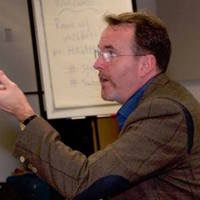
Don Ross
I'm Professor and Head of the School of Society, Politics, and Ethics at University College Cork, Ireland; Professor of Economics at the University of Cape Town, South Africa; and Program Director for Methodology at the Center for Economic Analysis of Risk, Georgia State University, USA. My research focuses on the foundations of economic theory, the experimental economics of addiction, risk, and time preference, philosophy of science, and infrastructure, trade and industry policy in Africa.
Notable publications include ECONOMIC THEORY AND COGNITIVE SCIENCE: MICROEXPLANATION (MIT Press 2005); MIDBRAIN MUTINY: THE PICOECONOMICS AND NEUROECONOMICS OF DISORDERED GAMBLING (with Carla Sharp, Rudy Vuchinich and David Spurrett, MIT Press 2008); EVERY THING MUST GO: METAPHYSICS NATURALIZED (with James Ladyman, Oxford University Press 2007) and PHILOSOPHY OF ECONOMICS (Palgrave Macmillan 2014). I'm co-editor with Harold Kincaid of THE OXFORD HANDBOOK OF PHILOSOPHY OF ECONOMICS (2009).
I'm the author the article on Game Theory in the Stanford Encyclopedia of Philosophy. Go to https://plato.stanford.edu/entries/game-theory/
I'm Canadian, a long-time resident of South Africa, and married to Dr. Nelleke Bak.
Phone: +27 83 701-3757
Address: Dean's Office, Faculty of Commerce, University of Cape Town, Private bag, RONDEBOSCH 7701, Cape Town, SOUTH AFRICA
Notable publications include ECONOMIC THEORY AND COGNITIVE SCIENCE: MICROEXPLANATION (MIT Press 2005); MIDBRAIN MUTINY: THE PICOECONOMICS AND NEUROECONOMICS OF DISORDERED GAMBLING (with Carla Sharp, Rudy Vuchinich and David Spurrett, MIT Press 2008); EVERY THING MUST GO: METAPHYSICS NATURALIZED (with James Ladyman, Oxford University Press 2007) and PHILOSOPHY OF ECONOMICS (Palgrave Macmillan 2014). I'm co-editor with Harold Kincaid of THE OXFORD HANDBOOK OF PHILOSOPHY OF ECONOMICS (2009).
I'm the author the article on Game Theory in the Stanford Encyclopedia of Philosophy. Go to https://plato.stanford.edu/entries/game-theory/
I'm Canadian, a long-time resident of South Africa, and married to Dr. Nelleke Bak.
Phone: +27 83 701-3757
Address: Dean's Office, Faculty of Commerce, University of Cape Town, Private bag, RONDEBOSCH 7701, Cape Town, SOUTH AFRICA
less
Related Authors
Daniel D. Hutto
University of Wollongong
Muqtedar Khan
University of Delaware
Carina Ray
University of Michigan
Julita Vassileva
University of Saskatchewan
Michael Spivey
University of California, Merced
David Pierre Leibovitz
Carleton University
Cristina Bicchieri
University of Pennsylvania
Oludamini Ogunnaike
University of Virginia
Antonio Cabral
UERJ - Universidade do Estado do Rio de Janeiro / Rio de Janeiro State University
Elisabetta Silvestri
University of Pavia
InterestsView All (53)










Uploads
Books by Don Ross
Highlighting key areas of methodological controversy, the Modern Guide looks at estimating utility functions in choice data, causal modelling, and ethics in randomised control trials. Chapters further explore topical issues, including: economists’ attitudes to other disciplines; gender bias in economic research; methods of modelling social influence in economics; behavioural welfare economics; anti-poverty policy controversies; and inflexible reliance on DSGE models in macroeconomics. Furthermore, it explores the implications of the last financial crisis for macroeconomic confidence, and ways to adapt abstract theory to everyday policy advice.
Avoiding philosophical jargon, and with the majority of chapters written by economists, this Modern Guide will challenge economists and scholars of philosophy of economics to engage with different approaches to the topic. This will also be a useful tool for policy makers administering nudges, development initiatives, macro-forecasting and monetary policy.
https://global.oup.com/academic/product/scientific-metaphysics-9780198744108?cc=ie&lang=en&
https://www.palgrave.com/gp/book/9780230302969
https://mitpress.mit.edu/books/what-addiction
https://global.oup.com/academic/product/the-oxford-handbook-of-philosophy-of-economics-9780195189254?cc=ie&lang=en&
https://mitpress.mit.edu/books/midbrain-mutiny
https://global.oup.com/academic/product/every-thing-must-go-9780199276196?cc=ie&lang=en&
https://mitpress.mit.edu/books/distributed-cognition-and-will
Of interest to economics and policy makers, Development Dilemmas is a long-awaited addition to the debate over economics and political philosophy in the developing world.
https://books.google.ie/books/about/Development_Dilemmas.html?id=havfPPfxtx0C&redir_esc=y
https://mitpress.mit.edu/books/economic-theory-and-cognitive-science
https://www.amazon.com/Daniel-Dennett-Contemporary-Philosophy-Focus/dp/0521008646
https://mitpress.mit.edu/books/dennetts-philosophy
Papers by Don Ross
Highlighting key areas of methodological controversy, the Modern Guide looks at estimating utility functions in choice data, causal modelling, and ethics in randomised control trials. Chapters further explore topical issues, including: economists’ attitudes to other disciplines; gender bias in economic research; methods of modelling social influence in economics; behavioural welfare economics; anti-poverty policy controversies; and inflexible reliance on DSGE models in macroeconomics. Furthermore, it explores the implications of the last financial crisis for macroeconomic confidence, and ways to adapt abstract theory to everyday policy advice.
Avoiding philosophical jargon, and with the majority of chapters written by economists, this Modern Guide will challenge economists and scholars of philosophy of economics to engage with different approaches to the topic. This will also be a useful tool for policy makers administering nudges, development initiatives, macro-forecasting and monetary policy.
https://global.oup.com/academic/product/scientific-metaphysics-9780198744108?cc=ie&lang=en&
https://www.palgrave.com/gp/book/9780230302969
https://mitpress.mit.edu/books/what-addiction
https://global.oup.com/academic/product/the-oxford-handbook-of-philosophy-of-economics-9780195189254?cc=ie&lang=en&
https://mitpress.mit.edu/books/midbrain-mutiny
https://global.oup.com/academic/product/every-thing-must-go-9780199276196?cc=ie&lang=en&
https://mitpress.mit.edu/books/distributed-cognition-and-will
Of interest to economics and policy makers, Development Dilemmas is a long-awaited addition to the debate over economics and political philosophy in the developing world.
https://books.google.ie/books/about/Development_Dilemmas.html?id=havfPPfxtx0C&redir_esc=y
https://mitpress.mit.edu/books/economic-theory-and-cognitive-science
https://www.amazon.com/Daniel-Dennett-Contemporary-Philosophy-Focus/dp/0521008646
https://mitpress.mit.edu/books/dennetts-philosophy
influence between economic and psychological theory and
experimentation. However, as behavioral economics has become
increasingly integrated into the main stream in economics, and as
psychology has remained damagingly methodologically conservative,
this convergence has recently gone into reverse. At the same time,
growing appreciation among economists of the limitations of atomistic
individualism, along with advantages in econometric modeling
flexibility by comparison with psychometrics, is leading economists to
become more pluralistic than psychologists about the ontology of
behavioral causation and structures. This, combined with economists’
growing interest in network models, is drawing economists closer in
theory and practice to sociologists who use quantitative or mixed
methods.
'The atomistic understanding of mind is not, in my view, even generally useful as an idealisation. It profoundly misrepresents what minds are. Following Dennett and many other current philosophers, I’m persuaded that minds are constructs built under social pressure. People are socially required, in order to usefully contribute to joint projects, to be comprehensible and relatively consistent, but also to manifest some identifying ‘signature’ patterns in their self-presentations that distinguish them from others.'
'Biology tends never to yield bright lines between conditions like ‘has language / does not have language’. My co-investigators and I are empirically studying one piece of this tangle of relationships, the prospect that elephants, like humans, manage uncertainty by using joint representations to transform it into risk. We’re doing this by adapting the experimental design we use with humans in our experimental economics lab. Elephants can do enough basic arithmetic to learn how to consistently distinguish uncertain prospects by magnitude differences, and conditional probabilities don’t baffle them.'
'‘Theory’ means different things in different sciences. In some it’s customary to refer to very general hypotheses as theories. But in economics theory means: a structure that can be used to identify data and estimate parameters. By direct implication, then, a theory is a filter, a device to force consistency in interpreting observations so that knowledge can, if we’re lucky and careful, accumulate.'
'... the most fruitful and successful work in economics is social science, not behavioural science. Insofar as economics has a fundamental class of phenomena to study, these have always been, and remain, markets. The concept of a market applies very broadly, to any system of networked information processing about relative marginal values of flows and stocks of resources that agents in the network seek to control. Markets of goods and services that are priced using money are only one, hugely socially important, kind of market. But where the question at hand is concerned they all have something in common: they are social phenomena.'
'Friendship is among the greatest of human goods, because its true manifestation is helping specific others defend and extend what is special about them.'
'I see no reason to regard ... Sellarsian / Dennettian work as metaphysics, since it isn’t trying to discover the general structure of reality. It’s cognitive anthropology, aiming to enrich and empower our knowledge of ourselves. Art does that too, though it’s only one of many enormously valuable things that art does. But enhanced knowledge of the objective structures of the world that are independent of human practical and moral concerns is delivered only by empirical science and mathematics. So thought the positivists, and they were right (about that).'
' 3:16 3:16(/) (/)